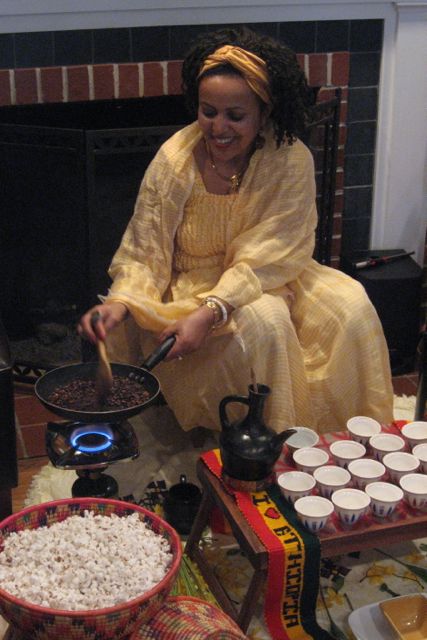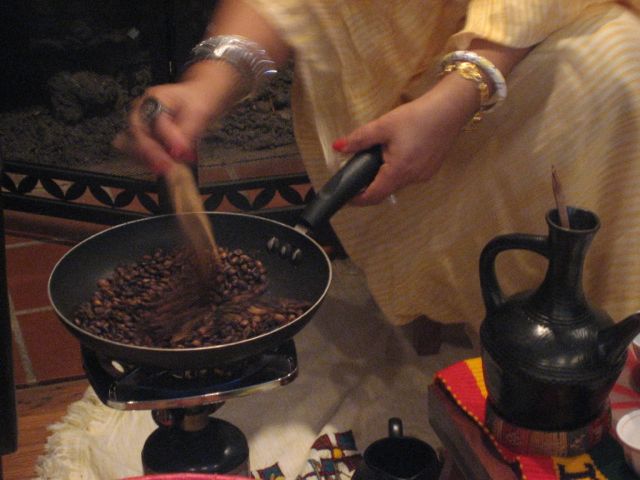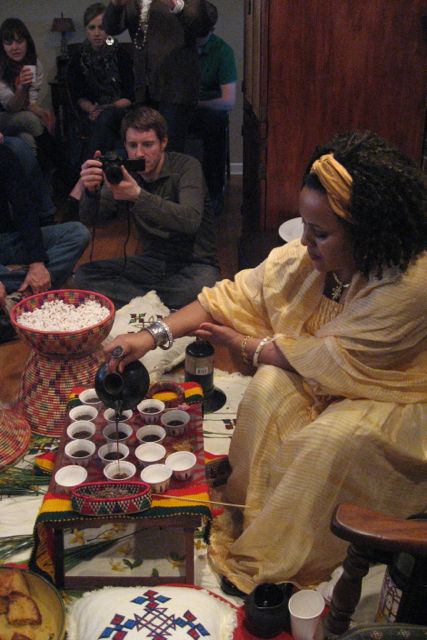I love that phrase, and all it implies—sitting down with a friend, sipping coffee from a real cup and chatting in a way I rarely take time to do these days. It’s a communal experience, one that hasn’t changed much over the centuries.
Farmers in small Kansas towns like the one I grew up in still gather around the pot at the Co-op, talking crops and weather. Villagers in Ethiopia, where Revocup’s Habte Mesfin is from, share their morning coffee with friends and neighbors. Customers lean over the counter at Oddly Correct Coffee Roasters, discussing music, beans and art with owner Gregory Kolsto as traffic buzzes down Kansas City’s Main Street.
Coffee’s clearly a catalyst for community wherever you happen to be, a point illustrated recently during an Ethiopian coffee ceremony hosted by Mesfin and his wife, Nigist “TG” Ambachew, at a friend’s home in Prairie Village.

Kolsto was there with his wife and kids, as was Michael Johnson, who sits on the Revocup Coffee Foundation board, and a few other coffee types. But otherwise, the house was filled with people who simply love good coffee, including the hostess—a college friend whose home I hadn’t realized I was going to—and my cousin, who I hadn’t known was coming.
I’m not sure what I expected out of this “ceremony.” Coffee in modern America is a quick thing, micro-roasted beans and pour-overs not withstanding. This was anything but.
Ambachew began the wonderfully unceremonious ceremony only after the house was full. Seated on a low chair, she lit what looked like a camp stove, poured about two cups of green, natural process Ethiopian Sidamo beans into a non-stick skillet, and began roasting them over the open flame.
As Ambachew stirred the beans, she and Mesfin explained that in Ethiopia, where coffee is widely believed to have originated, you never make coffee just for yourself. If you want a cup, you invite friends and neighbors to join you as you roast, grind and brew coffee from scratch.

Families share news, women gossip and disputes are resolved while the coffee roasts. Indeed, sharing coffee is an essential part of being Ethiopian, regardless of which of the 80-plus ethnic groups you belong to, Mesfin said.
“No matter where people are from, no matter what language they speak, you find coffee at the center of the culture,” he said.
After about five minutes, the beans began snapping and crackling. After another five or so, they darkened and gave off a whiff of smoke. When the beans were finally a deeply burnished brown, Ambachew turned off the flame and set them aside to cool.
While waiting, we nibbled on popcorn and chunks of an Ethiopian bread called dabo—there were two versions, one plain and one spiked with bebere (a spicy red pepper blend), both made by Elsa’s Ethiopian Restaurant. The room still smelled rich and smoky from the coffee; in Ethiopia, fresh flowers and grasses would have been brought in from the garden to add to the aroma, Ambachew said.

The coffee was ground, brewed and then served in tiny cups, bright and effervescent in its freshness. It seemed like such a small thing, a drop in the almost 2.2 billion cups of coffee consumed worldwide each day. But, as Mesfin explained, small things can lead to big changes.
How small? A dime. A single dime for each cup of coffee he sells. That’s how much Mesfin contributes to the Revocup Coffee Foundation, a 501(c)3 organization he created last year to help improve the living conditions of coffee farmers in Ethiopia. Already it’s enough to build and stock the foundation’s first library there.
Why? Because coffee can be so much more than just a beverage.
“It’s not about coffee,” Mesfin said. “It’s about humanity.”
Kind of makes me want to go for a coffee. How ’bout you?